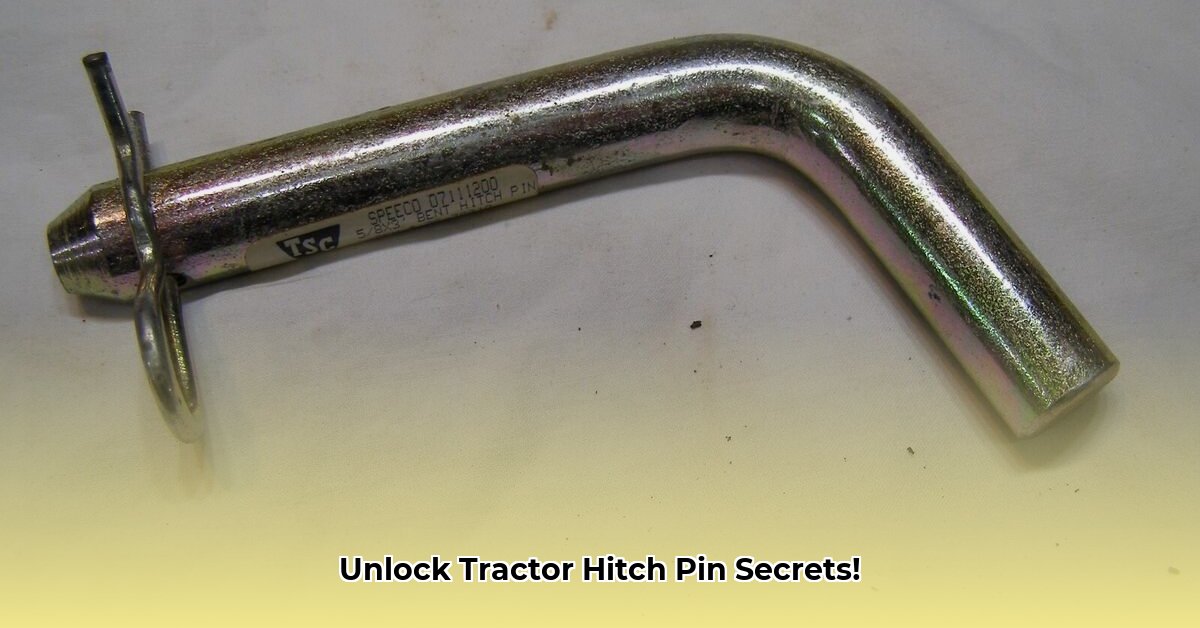
Finding the right hitch pin might seem insignificant, but it's crucial for safe and efficient operation of your agricultural equipment. This comprehensive guide, utilizing Tractor Supply's extensive selection, will equip you with the knowledge to select, install, and maintain hitch pins effectively.
Understanding Hitch Pin Types and Applications
Hitch pins are the unsung heroes connecting implements to tractors and other machinery. Several types cater to different needs:
Clevis Pins: (Simple pins with a head on one end) These are versatile and commonly used for quick connections, ideal for lighter-duty tasks. However, they may not provide the same level of security as other types under heavy loads.
Cotter Pins: (Slender pins used to secure clevis pins) These inexpensive safety devices slide through a hole in the clevis pin, preventing accidental slippage. Essential for preventing accidents.
Locking Hitch Pins: (Pins with built-in locking mechanisms) These offer superior security, especially crucial for heavy-duty applications and high-vibration environments, ensuring the pin remains firmly in place.
Spring Pins: (Pins with an internal spring for easy installation and removal) These are designed for applications requiring frequent attachment changes, offering a convenient and time-saving solution.
Did you know that using the incorrect hitch pin can lead to equipment damage or even injury? Choosing the right one is paramount for safety and efficiency.
Choosing the Right Hitch Pin: A Step-by-Step Guide
Selecting the proper hitch pin is crucial. Follow these steps to ensure a perfect fit:
Measure Accurately: Carefully measure the diameter and length of the hole where the pin will be inserted. Inaccurate measurements can lead to a loose fit or inability to insert the pin.
Consider the Material: Steel is durable and cost-effective, while stainless steel offers superior corrosion resistance, making it ideal for outdoor use. The choice depends on the application's environment and demands.
Assess the Load Capacity: Determine the weight and stress the pin will endure. Select a pin with a load rating significantly exceeding the expected load to ensure safety. Underestimating the load can lead to pin failure.
Prioritize Safety Features: For heavy-duty equipment or critical hitches, locking pins are essential. The added security offered by their locking mechanisms outweighs the slightly higher cost. Safety should never be compromised.
Utilize Tractor Supply's Resources: Tractor Supply offers a wide selection of hitch pins. Their website and knowledgeable staff can assist you in finding the perfect pin for your specific application.
Installing Hitch Pins: A Safe and Efficient Process
Correct installation is vital for safety and equipment longevity. Follow these instructions:
Precise Alignment: Ensure the components are properly aligned before inserting the pin. Misalignment can bend the pin or damage equipment.
Gentle Insertion: Gently push the pin into the holes. Forcing the pin usually indicates an incorrect size or misalignment.
Secure the Locking Mechanism: If using cotter or locking pins, ensure the locking mechanism is firmly in place. Always double-check to prevent accidents.
Visual Inspection: After installation, visually inspect the connection. A bent or damaged pin, or a loose connection, necessitates further investigation and correction.
Maintaining Hitch Pins: Extending Their Lifespan
Regular maintenance prevents premature failure and ensures safety:
Inspect for Bends: Bent pins are weakened and unsafe. Replace immediately.
Combat Corrosion: Clean and lubricate pins regularly, especially those used outdoors, to prevent rust and corrosion.
Monitor Wear and Tear: Replace pins showing significant wear or damage. This prevents potential failure and ensures continued safe operation.
Troubleshooting Common Hitch Pin Problems
Even with careful selection and installation, issues can arise:
Stuck Pin: Check alignment and ensure correct size. Lubrication may help.
Slipping Pin: The locking mechanism might be faulty or improperly secured. Inspect and repair or replace as needed.
Bent Pin: Replace immediately—a bent pin is structurally compromised and a safety hazard.
Tractor Supply's staff can offer additional support and assistance. They are a valuable resource for both product selection and troubleshooting.
Key Takeaways:
- Selecting the correct hitch pin is crucial for ensuring safe and efficient operation of agricultural equipment.
- Regular inspection and maintenance extend the lifespan of hitch pins and enhance safety.
- Tractor Supply offers a wide variety of hitch pins to suit diverse needs.
Remember, a seemingly small component like a hitch pin plays a significant role in the overall functionality and safety of you agricultural operation. Invest in quality and proper maintenance for optimal results.